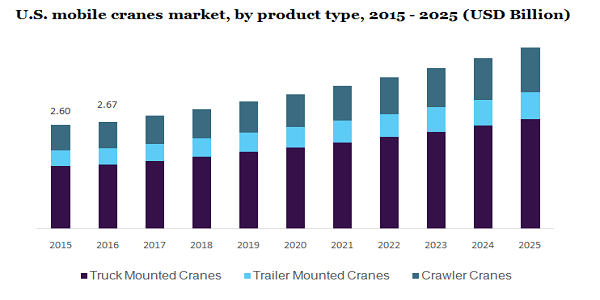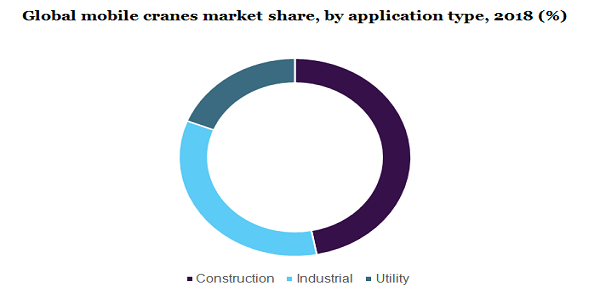- US: +1-408-610-2300
- Toll Free: +1-866-831-4085
- Become a Client
The global mobile cranes market size was accounted for USD 11.36 billion in 2018 and expected to grow at a CAGR of 6.1 % during the forecast period, from 2019 to 2025. The rising commercial and residential construction in economically developing countries is expected to drive market growth. Cranes are one of the most powerful pieces of equipment, capable of lifting around a few hundred tons of weights. These cranes are utilized in various operations such as power projects, automotive, manufacturing, mining, and building constructions. Hence, several benefits associated with mobile cranes across various applications are expected to propel the product demand in the next few years.

Due to the high cost of cranes, most of the construction companies prefer rented cranes instead of purchasing them. In addition, the maintenance and repair cost is high as compared to other construction machinery.
Rapidly changing lifestyles and work opportunities in urban areas are influencing people to shift from rural to urban areas across the globe. Thus rapidly increasing urbanization has created a deficit of residential houses in urban areas. Therefore, government and private contractors are investing in the construction of hospitals, schools, and buildings. These above-mentioned factors are expected to boost the demand for mobile cranes in the next few years.
However, manufactures are facing some challenges to export their products due to various norms regarding regulation, requirements, and specifications across many countries and regions implemented by the government. Hence, companies are engaged in manufacturing customized products as per customer requirements and norms for different countries.
Based on product types, the market is bifurcated into crawler cranes, trailer-mounted cranes, and truck-mounted cranes. In 2018, the truck-mounted cranes dominated the market with more than 63.0% market share. These cranes help to move goods from one place to another easily along with high loading capacity. Truck-mounted cranes are also used in the construction of railway projects, hydro projects, and bridges.
Trailer-mounted cranes are helpful to use in small operations including lifting metals, industrial goods, and reuse operations. Crawler cranes are one of the powerful cranes used for large-scale construction developments. However, trailer mounted and crawler cranes have gained very less market share, in 2018 owing to having limited applications.
On the basis of applications, the market is fragmented into utility, construction, and industry. In 2018, the construction segment accounted for the largest market share of more than 52.0% in terms of revenue. Once tower cranes are installed, they cannot be relocated to another place until the project is finished. Hence, mobile cranes are majorly preferred by builders working on multiple projects, as mobile cranes are easy to move. These cranes are also reduced the idle time of the equipment which helps to increase the overall productivity.

In this market, the industrial segment held the second-largest market share, in 2018. Many industries such as manufacturing industries require moving the number of equipment and raw materials from one place to another. Mobile cranes help to move such materials within or outside the plants. They also help to load heavy equipment or machinery into trucks that need to be transferred to remote places.
In 2018, Asia Pacific led the market in terms of revenue share with more than 35.0%. The presence of countries like Taiwan, Japan, South Korea, China is characterized by the existence of various industries that used mobile cranes for several applications. In addition, the construction industry is expected to have robust growth due to rising urbanization. Japanese companies like Kobelco Construction Machinery Co., Ltd., Kato Works Co., Ltd., Sumitomo Heavy Industries Ltd., and Tadano Ltd. are the leading players in this industry. However, policies imposed by the Japanese government have led to the rise of several challenges. This factor has enforced manufacturers to transfer their manufacturing operations to China in order to expand their business.
The Middle Eastern mobile crane market is projected to grow with a CAGR of over 6.0% during the forecast period, 2019 to 2025. This growth can be attributed to rising investment in residential and commercial infrastructure projects. The upcoming Qatar FIFA World Cup is projected to open new growth opportunities for construction machinery including mobile cranes, by 2022.
Several companies engaged in the construction sector have been affected due to the current COVID-19 outbreak. Several restrictions are placed by governments across the globe in order to control the spread of coronavirus. This initiative has triggered a shortage of manpower, raw materials, and also disrupted the supply chain in the construction industry. This has negatively impacted the demand for mobile cranes in the current situation. In addition, industrial product companies across the globe are facing supply chain disruption, workforce dislocation, and halted production, which is expected to hamper market growth.
However, product launches with the latest technology used in the mobile cranes are expected to drive the market post lockdown, when construction projects are allowed to resume operations. For example, TIL limited introduced two cranes with the name Mobiload 415 and RT880 with advanced features.
The mobile crane market is highly concentrated and competitive in nature. The prominent players operating in this market are Mammoet Holding BV; Manitowoc, XCMG Group, Liebherr International AG, and Kobelco Constriction Machinery Co. Ltd. In 2018, the above-mentioned companies have dominated the market and accounted for the largest market share of global revenue. To sustain a competitive advantage in the market, market players are implementing several strategies such as partnership, merger & acquisition, and expanding their product portfolio. For example, in 2018, Kobelco Construction Machinery Co., Ltd.’s subsidiary Kobelco Construction Equipment India Pvt. Ltd. has increased its production capacity of a hydraulic excavator in India. This strategy has emphasized the enhancement of cooperation, expansion of the building, and improvement in the production process with the crane factory. Additionally, in 2019, Tadano Ltd. acquired .assets and stocks of Demag Brand Crane Business from Terex Corporation. This corporation is engaged in producing lifting as well as material handling solutions. Major players operating in this market are as follows:
|
Attribute |
Details |
|
The size value in 2020 |
USD 12.6 billion |
|
The revenue forecast in 2025 |
USD 17.0 billion |
|
Growth Rate |
CAGR of 6.1 % from 2019 to 2025 |
|
The base year for estimation |
2018 |
|
Historical data |
2015 - 2017 |
|
Forecast period |
2019 - 2025 |
|
Quantitative units |
Revenue in USD billion and CAGR from 2019 to 2025 |
|
Report coverage |
Revenue forecast, company ranking, competitive landscape, growth factors, and trends |
|
Segments covered |
Product type, application type, region |
|
Regional scope |
North America; Europe; Asia Pacific; Latin America; Middle East & Africa |
|
Country scope |
U.S.; Canada; Germany; U.K.; China; India; Japan; Brazil; Mexico |
|
Key companies profiled |
Liebherr International AG; Manitowoc; XCMG Group; Kobelco Constriction Machinery Co. Ltd.; Mammoet Holding BV |
|
Customization scope |
Free report customization (equivalent to up to 8 analysts working days) with purchase. Addition or alteration to country, regional & segment scope. |
|
Pricing and purchase options |
Avail of customized purchase options to meet your exact research needs. |
This report forecasts revenue growth at global, regional, and country levels and provides an analysis of the latest industry trends in each of the sub-segments from 2015 to 2025. For the purpose of this study, Million Insights has segmented the global mobile cranes market report on the basis of product type, application type, and region:
• Product Type Outlook (Revenue, USD Billion, 2015 - 2025)
• Truck Mounted
• Trailer Mounted
• Crawler Crane
• Application Outlook (Revenue, USD Billion, 2015 - 2025)
• Construction
• Industrial
• Utility
• Regional Outlook (Revenue, USD Billion, 2015 - 2025)
• North America
• U.S.
• Canada
• Europe
• U.K.
• Germany
• the Asia Pacific
• China
• India
• Japan
• Latin America
• Brazil
• Mexico
• Middle East & Africa


Research Support Specialist, USA